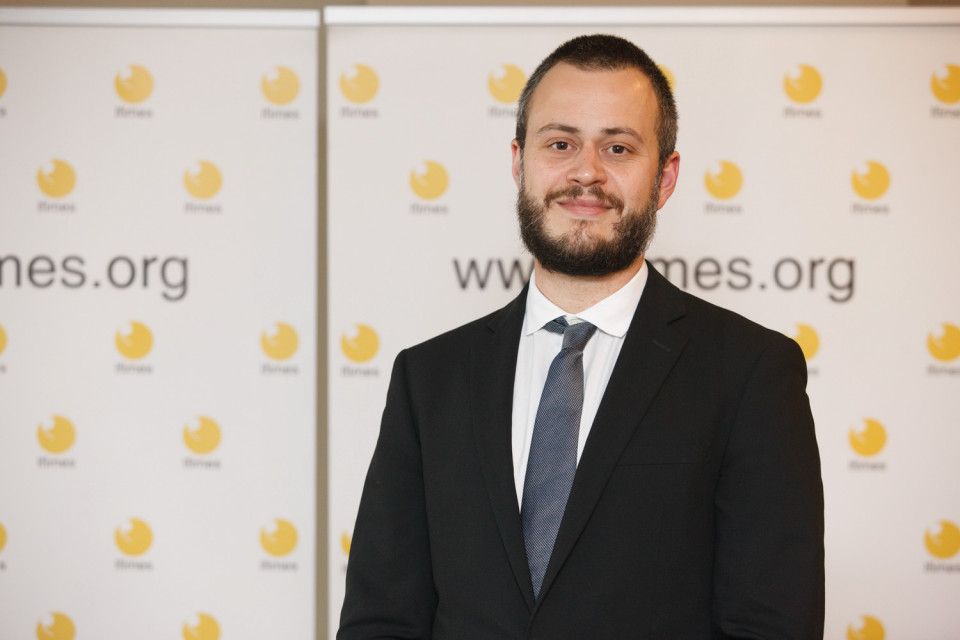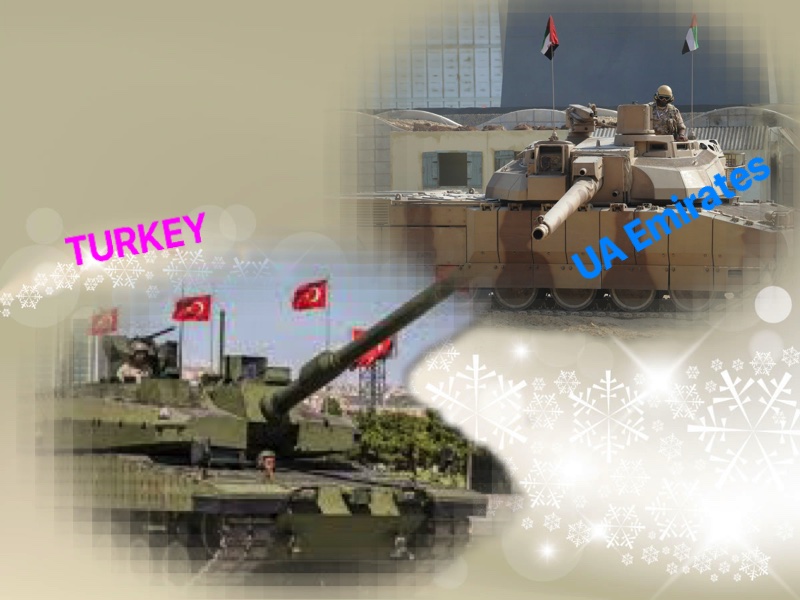image copy right- SomTribune
19.07.2020

 ●
●
● Antonio Occhiuto ● Giorgio Cafiero
It is impossible to deny that tensions between Turkey and the United Arab Emirates (UAE) are escalating. Although relations between these two powers have been worsening since the “Arab Spring” uprisings of 2011, this year the Turkish-Emirati “Cold War” is heating up significantly. Abu Dhabi and Ankara are challenging each other across the Middle East and North Africa (MENA)—from Libya to Qatar and Syria to Yemen—while other regions such as the Balkans, Central Asia, and the Horn of Africaare also theaters for their competition.
In May 2020, Ankara’s chief diplomat, Mevlut Cavusoglu, accused Abu Dhabi of sowing chaos through its military interventions in Libya and Yemen. These words from Cavusoglu were a response to a joint statement made by Cyprus, Egypt, France, Greece, and the UAE, which condemned Ankara’s military intervention in Libya that has severely weakened the Emirati-sponsored General Khalifa Haftar’s power. “If you are asking who is destabilizing this region, who is bringing chaos, then we would say Abu Dhabi without any hesitation,” said Turkey’s top diplomat. “It is a reality that they are the force that has unsettled Libya and destroyed Yemen.”
In April 2020, Turkish authorities blocked Emirati news outlets along with Saudi ones too. Many observers interpreted the move as retaliation for Riyadh’s decision to block Turkey’s state broadcaster and news agency. That Ankara also targeted the UAE’s news websites (despite the Emiratis not taking such actions against any Turkish website) underscored how much tension plagues Turkey-UAE relations. This action came only a few weeks after prosecutors in Turkey indicted 20 Saudis in connection to the Jamal Khashoggi murder of October 2018, which Saudi Crown Prince Mohammed bin Salman (MbS) purportedly ordered.
Ideological Dynamics
Over the past ten years, numerous events in the MENA region have intensified friction in Turkey-UAE relations. Yet it is useful to look at the ideological dimensions of this rivalry, which bring us back to the Justice and Development Party (AKP)’s ascendancy to power in 2002. Since its creation, the AKP, which is the most successful political party in the Turkish Republic’s history, has belonged to a wide network of Islamist movements. The current foreign policy vision of President Recep Tayyip Erdogan builds on the AKP’s deep roots in political Islam and views Ankara as the natural political leader of the larger Muslim world.
Led by the UAE’s de facto ruler, Crown Prince Mohammed bin Zayed (MbZ), Abu Dhabi is rigidly opposed to virtually all types of political Islam. The UAE’s leadership sees the Muslim Brotherhood as an extremist and terrorist threat, which the Emiratis have been determined to crush across the greater Arab region since 2011.
Ankara and Abu Dhabi’s ideological clash has no end in sight. Moreover, with Turkey’s intervention in Libya proving to be damaging to Emirati ambitions in the Maghreb while Ankara is also beginning to play more of a visible role in Yemen and continuing to help Qatar stand strong across the Emirati-Saudi bloc as the blockade continues in its fourth year, the UAE’s perception of the alleged Turkish threat is growing. At the same time, the Emirati leadership’s disdain for Turkey also stems from the fact that Istanbul is home to Emirati dissidents who, from Turkey, voice their opposition to MbZ’s rule.
The Turkish government’s support for Islamist actors in the region amid the Arab Spring revolts of 2011 did much to leave Abu Dhabi with the view of Ankara as a destabilizing force behind a “radical” ideology. The UAE has seen the prospects for revolutionary change in the Arab world as deeply disturbing. Thus, Abu Dhabi has invested substantial resources into its “counter-revolutionary” agenda aimed at rolling back the Arab Spring revolutions which shook the MENA region nearly a decade ago.
Coups and Attempted Coups
The Egyptian coup of July 2013 was largely bankrolledby the UAE and Saudi Arabia at a time in which Abu Dhabi was determined to topple the Turkey-friendly Muslim Brotherhood order that took power in Cairo as a result of Hosni Mubarak’s ouster and the subsequent democratic elections. The pro-Morsi and anti-coup rally that took place in Ankara in August 2013 helped illustrate the emotions of Turks who were angry about the military junta’s takeover of the Egyptian state, which fuelled major baggage in Turkey’s relations with Egyptian President Abdel Fatah el-Sisi’s Gulf backers, chiefly the UAE. Ankara’s support for Egypt’s ousted Islamist president sparked a diplomatic row in which Abu Dhabi withdrew its ambassador to Turkey the same month as the coup.
Later the Emiratis condemned Turkey for shooting down of a Russian fighter jet in northern Syrian in November 2015. That episode fueled more tension between Ankara and Abu Dhabi, although the events which took place in Turkey on July 15, 2016 would increase temperatures to a whole new level.
Three years after Morsi’s fall, the failed coup plot in Turkey led to even more anti-Emirati sentiments throughout Turkey. Turkish politicians and media outlets have consistently maintained that Abu Dhabi had a hand in the effort to overthrow Turkey’s AKP-controlled government. About 11 months after the putschists attempted to topple Erdogan, the Turkish president stated that he was aware about “how certain Gulf countries [ie. the UAE] rejoiced during the night of the attempted coup in Turkey” and “we know very well the kind of money that was spent.”
The Gulf Cooperation Council (GCC) crisis that erupted in 2017 marked another key point in the downward spiral in Turkey-UAE relations. The Gulf dispute largely had its roots in Abu Dhabi’s decision to bring Arab/Islamic countries together to pressure Doha into capitulating to a series of demands that included the closure of Turkey’s military base in Qatar. The Turkish role in strengthening Qatar’s posture amid the crisis did much to explain why Doha has been able to circumvent the siege without having to humiliatingly capitulate to the blockading states.
For his part, MbZ considers the Turkey-Qatar alliance the most dangerous international threat to the UAE’s foreign policy agenda. Qatar’s mass investments in Turkey’s economy—Doha’s investment in Turkey exceeds USD 20 billion, the second highest by any country—and Qatari efforts to stabilize Ankara’s currency, have provided Erdogan with the resources to maintain Ankara’s ambitious and Muslim Brotherhood-friendly foreign policy across the Arab region.
Moreover, Turkish officials saw Abu Dhabi’s efforts to strangle Qatar as far of an agenda geared toward bringing about regime change in Doha. Ankara’s view is that the blockade resulted from a “fabricated crisis” aimed at carrying out a coup to oust the Qatari emir, similar to what the Emiratis (along with others in the Gulf) sought to do to Qatar’s leader in 1996 amid “Operation Abu Ali”.
Abu Dhabi’s Ties to Anti-Turkish Kurdish Factions
In January 2018, Turkey launched Operation Olive Branch in northern Syria. This Turkish military campaign targeted the Kurdistan Workers’ Party (PKK) – affiliated People’s Protection Unit (YPG). Media outlets in Turkey have accused the UAE of sponsoring the YPG in various ways. Amid Operation Olive Branch, the Emirati press depicted the Turks as aggressors while reporting on the YPG in sympathetic ways which outraged officials in Ankara. UAE-based media outlets have similarly reported on subsequent Turkey military interventions in Syria too. Additionally, Abu Dhabi’s decision to restore official diplomatic relations with the Syrian government in December 2018 also infuriated Turkey’s leadership, which sees the UAE working to bring Damascus back into the Arab world’s diplomatic fold within the framework of Abu Dhabi’s efforts to unite Arab/Islamic and European countries against Turkey.
Northern Iraq has purportedly become a new flashpoint in Ankara and Abu Dhabi’s confrontation. In June, Turkey launched two military operations, “Claw-Eagle” and “Claw-Tiger”, targeting PKK militants in northern Iraq. Crucially, Turkey’s decision to launch the twin operations took place amid reports about the UAE allegedly supporting the PKK. Notably, the Erbil-based Kurdistan Regional Government (KRG) confirmed that it traced multiple instances of funds transferred from the Emirates to the PKK. Both Ankara and the KRG believe that Abu Dhabi is deeply interested in financing the PKK’s operations in order to exacerbate Turkey’s security dilemmas in its own neighborhood.
Surrogate Warfare in Libya
The “Cold War” between Turkey and the UAE has fueled more instability in Libya than anywhere else in the region. More recently, in April 2019 Libyan General Khalifa Haftar launched his western offensive to capture Tripoli and topple the UN-recognized, Turkish-backed Government of National Accord (GNA). The failure of Haftar’s side to achieve its objectives has been largely a result of Ankara’s decision to intervene militarily in defense of the GNA. Ankara’s deployment of Bayraktar TB2s drones to Libya gave a major boost to the militias allied with the Tripoli-based government. Ultimately, these drones plus other Turkish weaponry proved to be a game-changer that upset Abu Dhabi’s plans for facilitating a Haftar victory in the North African country’s nightmarish civil war. Dr. Abdulkhaleq Abdulla, an internationally respected Emirati political scientist, said that Tripoli was the first Arab capital to “fall to Turkish influence.”
Arguably, Turkey’s efforts in Libya are facilitated by the fact that both the UAE and Russia (two of Haftar’s chief backers) have been hit by the all-time low oil prices and the Covid-19 pandemic. This has reduced Moscow and Abu Dhabi’s willingness to counter Ankara’s initiative in Libya, at least in the short term. Nonetheless, the recent advance in which Turkey-backed GNA forces reached the outskirts of Sirte (a strategic port city and gateway to important oil terminals) has prompted Egypt’s leadership to threaten military intervention in Libya in case Ankara-backed forces capture that city. Currently, Egypt is struggling economically while its military is focused on the fight against Daesh-affiliated militants in the Sinai. Given the circumstances, it is highly likely that Cairo’s leadership threatened military action in Libya after receiving assurances from MbZ that the UAE is ready to provide substantial financial and logistical backing as well as air support in case Egypt intervenes in Libya to confront Turkey.
Crucially, Turkey’s military intervention in Libya came on the heels of a controversial Ankara-Tripoli maritime deal, which aims to create an exclusive economic zone from Turkey’s southern Mediterranean shore to Libya’s northeast coast. The deal has infuriated Cyprus, Greece, Egypt, and Libya’s Tobruk-based, Haftar-allied House of Representatives (HoR). For its part, the UAE has joined the front opposed to the deal and has increased its diplomatic engagements with both Athens and Nicosia.
The Volatile Horn of Africa
Libya is not the only part of the African continent where Ankara and Abu Dhabi’s competition is playing out. Both Turkey and the UAE are actively expanding their footprint in the Horn of Africa, a volatile region where many actors are scrambling to assert their influence. MbZ has already promoted Abu Dhabi’s entrenchment via commercial activities and the development of ports in Eritrea, Djibouti and Somaliland. Meanwhile, Turkey has established its largest overseas military training camp in Somalia and is seeking to deepen its ties with Mogadishu in all sectors.
Ankara and Abu Dhabi are also competing for influence inside Sudan. Turkey has significant interests in Sudan where it currently leases Suakin island for reconstruction purposes and portions of farming land. Erdogan achieved such results by developing a strong interpersonal relationship with Sudan’s former President, Omar Al-Bashir. However, since Khartoum’s new government, led by General Abdel Fattah Abdelrahman Burhan, took office, MbZ has gained the upper hand. For instance, the UAE has been able to expand its port control and development strategy to the city of Port Sudan, which hosts the country’s largest port. In addition, in an apparent blow to Ankara, when interrogated on the Sudan-Turkey deal involving Suakin, Burhan clearly stated that Khartoum would not tolerate a foreign military presence on the strategic island or elsewhere in the country. Indeed, with Abu Dhabi playing an increasingly prominent role in post-Bashir Sudan, any move by Ankara to establish a military presence in the country would constitute a major flashpoint. The growing influence of the UAE in Sudan has implications for the conflict in Libya. As recently as April 30, an Emirati delegation led by the UAE’s National Security Adviser, Tahnoun bin Zayed, travelled to Khartoum to discuss joint UAE-Sudan support for Haftar and to halt the offensive by Turkey-baked GNA forces.
The Unavoidable American Factor
Ankara fears the UAE’s lobbying capabilities and influence in Washington, which Turks view as a structural challenge to their country’s ability to cooperate with the US. Indeed, for years the UAE has been the main driver of anti-Turkey discourse in Washington. Back in May 2017, Abu Dhabi’s ambassador to Washington asserted that most Americans fail to comprehend Turkey and “the long-term threat it poses to most of us.”
Future Emirati lobbying in Washington will seek to increase distance between the US and Turkey. The UAE will be keen to capitalize on the Turkish government’s Hagia Sophia mosque plan, which has created an international controversy and given Abu Dhabi another issue for which to condemn Turkey before a global audience. “The UAE’s official rhetoric about Turkey has taken the form of ‘Arab solidarity’ versus ‘colonialism’ and ‘secularism’ versus ‘extremism’”, as Samuel Ramani, a doctoral researcher at Oxford University, explained. “The Hagia Sophia controversy has added ‘tolerance’ versus ‘intolerance’ to its narratives, as the UAE opposes Turkey’s decision.”
The mounting tension between Ankara and Abu Dhabi needs to be seen within the grander geopolitical context whereby US influence is on a relative decline. The gradual demise of American hegemony in the MENA region has created vacuums that both Turkey and the UAE are ambitiously seeking to fill with foreign policies that are increasingly muscular. Yet the two countries’ incompatible visions are leading observers to predict a continuation of this downward spiral in bilateral relations that has much potential to impact a growing list of countries from Africa to Central Asia.
Throughout the remainder of this year, Covid-19’s economic impact on each side will be a crucial factor. The pandemic will heavily influence the choices made by policymakers in both Ankara and Abu Dhabi, especially as both capitals exercise “corona diplomacy” to boost their own humanitarian credentials while furthering their geopolitical and strategic interests in the process. Looking beyond this global health crisis, the balance of power between the two sides will inevitably depend on Erdogan and MbZ’s ability to attract important regional and international players to their respective camps.
About the authors:
Antonio Occhiuto (@AntoninoOcchiut) is an analyst at Gulf State Analytics (@GulfStateAnalyt), a Washington, DC-based geopolitical risk consultancy.
Giorgio Cafiero (@GiorgioCafiero) is the CEO of Gulf State Analytics.
Source: IFIMES
[1] IFIMES – International Institute for Middle East and Balkan Studies, based in Ljubljana, Slovenia, has Special Consultative status at ECOSOC/UN, New York, since 2018.

